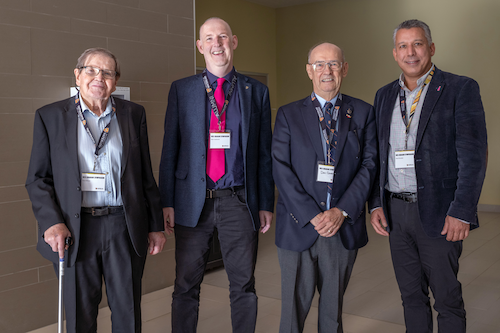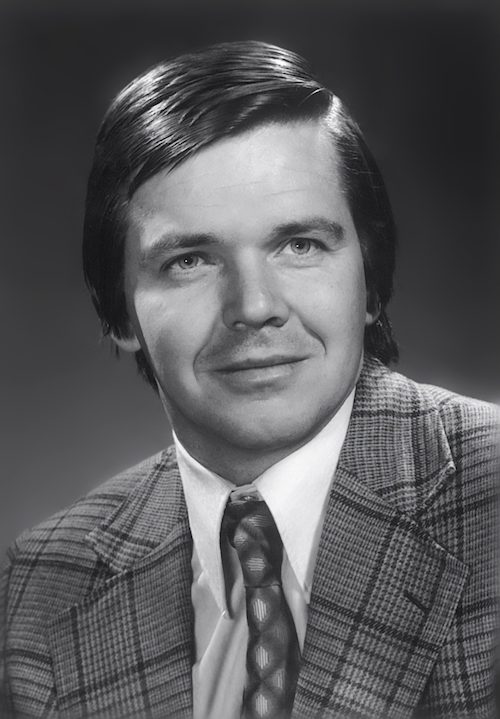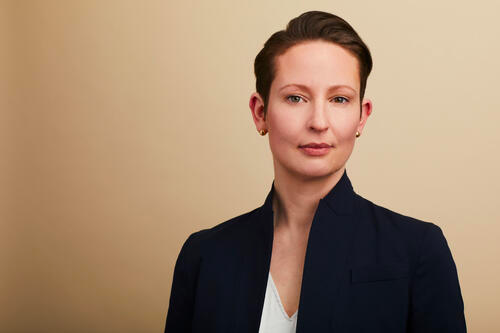Editor:
Brandon Sweet
University Communications
bulletin@uwaterloo.ca
Remembering Paul Dirksen, Waterloo computer science pioneer

Paul Dirksen (left) with Dean of Mathematics Mark Giesbrecht, Don Cowan, and Director of the David R. Cheriton School of Computer Science Raouf Boutaba at the 2022 Wes Graham Symposium.
This article was originally published on the Faculty of Mathematics website.

Paul Dirksen, a pioneering computer scientist at the University of Waterloo, passed away on April 8, 2023. He was 83.
Paul was born in 1939 in Saskatoon, Saskatchewan to German Mennonite immigrants, and grew up in Waterloo. He was one of the first students at the University of Waterloo, graduating with a B.Sc. in Applied Mathematics in 1963 and a M.Sc. in Computer Science in 1964. Paul’s professors and mentors Ralph Stanton and Wes Graham encouraged him to pursue a career teaching computer science at Waterloo, leading to a decades-long career.
Paul was a vital part of UW computing history. He was one of the developers of the WATFOR and WATFIV compilers for the IBM 360 mainframe system in the late 1960s. While a previous team had developed an earlier WATFOR for the IBM 7040, the 360 became the foundation architecture for several generations of IBM mainframes.
Waterloo’s WATFOR/WATFIV made the university internationally famous, with over 3,000 customers in 60 countries worldwide: mostly universities and large engineering or manufacturing firms. Along with Paul Cress and Wes Graham, Paul co-authored the FORTRAN-IV with WATFOR and WATFIV textbook, which was Prentice-Hall’s best seller for many years.
Paul was recruited to the University of Manitoba and spent a few years there, but at Wes Graham’s urging he returned to Waterloo in 1972 to help run the Computer Centre – later named the Department of Computer Services (DCS) after Paul succeeded Wes as Director. DCS ran the iconic IBM 360/75 mainframe, housed in the “Red Room” that occupied most of the lower floor of the Math & Computer building.
Waterloo alumnus and WATCOM co-founder Ian McPhee (MMath 1979) remembers working in Wes Graham’s Computer Systems Group, where he was assigned to enhance WATFIV with Structured Programming language extensions, making it WATFIV-S. “Paul invested quite a bit of time teaching me practical skills,” he recalls. “I always appreciated his mentorship and warm, down-to-earth manner.”
During the 1970s, Paul received international recognition and prestige in Computer Science, including the ACM (Association for Computing Machinery) Grace Murray Hopper Award for young innovators. Despite his growing renown, he was always willing to collaborate on projects, provide leadership, and work closely with students.

Together, Paul, Wes Graham, and Don Cowan started the Waterloo Foundation for the Advancement of Computing (WATFAC), which sponsored development of several software products to enable computing in education. WATFAC also provided summer fellowships for leading computer science and math high school teachers in the Waterloo Region, helping to build teaching capacity in the new field in the Waterloo region and beyond. These local teachers were encouraged to nominate talented math and computer science students for WATFAC summer fellowships, often leading to these students applying to Waterloo’s math and computer science programs for their university education. After Wes Graham’s death in 1999, the WATFAC board voted to wind up the foundation and contribute its assets as core funding of the Graham Trust at UW.
During the 1970s, Wes, Don, and Paul also collaborated to start a book publishing business, WATFAC Publications Limited. It published textbooks and manuals to enable the use of the many software tools for education developed by UW’s Computer Systems Group (CSG), DCS, WATFAC, and later WATCOM. In addition to his UW duties, Paul managed the publishing company for many years as its president.
In his spare time, Paul loved being outside in the garden and on the family farm, planting and harvesting corn, tomatoes, potatoes, and more. Paul and his wife Sandra loved classical music and were patrons of the Waterloo Symphony Orchestra for many years. Paul loved jogging and cycling, taking yearly trips to Europe.
He was an enthusiastic traveler, both near and far: besides family camping trips, road trips to Florida, and summers in Muskoka at Scarliffe lodge, Paul and Sandra enjoyed exploring Nova Scotia, Hawaii, Dominican Republic, New Zealand, and Antarctica. One of the great pleasures of Paul’s life was becoming a grandfather, or Papa: a privilege he took on with joy, love, and undivided attention.
Throughout all of his life, whether working, playing, or building a family and community, Paul is remembered as a down-to-earth, kind, warm-hearted, generous man with a zest for life and a willingness to mentor staff and students.
He is survived by his best friend and wife of 58 years, Sandra. He will be profoundly missed by his children David, James, and Heidi (Chris) and grandchildren Nathan and Mackenzie, as well as his brother Eric (Dee Anne) and family.
Cremation has taken place. A celebration of life will be held on Saturday June 3, 2023, at 3:00 p.m. at the Dirksen family home. Attendees are asked to confirm attendance in advance with Sandra Dirksen. In lieu of flowers, donations to KW Symphony Orchestra, the Humane Society, or Grand River Hospital may be arranged through the Erb & Good Family Funeral Home.
Futures Forum to be held May 10
The School of Planning will be hosting the inaugural Futures Forumon May 10. The Futures Forum focuses on the intersection between public engagement and technology and promises to be a day of learning, networking, and discussion. The forum will highlight opportunities and challenges of public engagement, as viewed through the lens of technological, socio-economic, and political changes.
The conference opens at 8:30 a.m. Professor Markus Moos, Director, School of Planning, will be the event's host and moderator.

Delivering the keynote address will be Biana Wylie, Partner, Digital Public and Co-founder, Tech Reset Canada, whose remarks are entitled "Public Engagement, Technology and the Art of Living Well Together."
"The narrative focus of the last political century has been defined by rights – civil, to the city, digital, and more," says the talk's abstract. "To deliver on the opportunities that democracy affords us, the next century will need to focus as much energy, if not more, on responsibilities, the flip side of the rights coin. Through this effort, public institutions can expand and bloom. Without this effort, they will continue their decline. An increase in populist tactics is arriving from people all along the political spectrum, seeking to leverage this moment to hold onto power. The time for your resistance to this situation is now. Urban planning, as one of the professions focused on defining and supporting the ways we live together, has a significant role to play in the development of a more defensible practice of democracy at the local level, including defining if and how to use technology in these efforts."
Following the morning keynote and lunch will be two afternoon panel sessions, “Digital citizen engagement: The good, the bad, and the in- between" and “Paying for it, Collectively: Municipal Finance and Public Engagement." The closing session is entitled “What have we learned? A Forum Conversation."
This in-person event will be held on the Waterloo campus (locations TBC). Registration information is available on the event website.
This event is open to all, but might be especially relevant to faculty, students and professionals in planning, urban/civil engineering, urban tech, digital societies, public engagement, and any related industries.
Gautam Kamath among eight Canada CIFAR AI Chairs named Vector Institute Faculty Member

By Joe Petrik. This article was originally published on Waterloo News.
Cheriton School of Computer Science Professor Gautam Kamath has been named a Canada CIFAR AI Chair and a Vector Institute Faculty Member in recognition of his contributions to differential privacy, machine learning and statistics. He is among eight outstanding researchers in the latest cohort of Canada CIFAR AI Chairs to receive this prestigious national recognition.
“Congratulations to Gautam on becoming a faculty member of the Vector Institute and on being named a Canada CIFAR AI Chair,” said Raouf Boutaba, professor and director of the Cheriton School of Computer Science. “Gautam’s research focuses on developing solutions for trustworthy and reliable machine learning and statistics. The fundamental work he and his students conduct is critically important as it allows useful insights to be drawn from data while preserving privacy of sensitive personal information.”
These recent appointments bring the number of Canada CIFAR AI Chairs to 126, continuing to grow Canada’s robust artificial intelligence research ecosystem and advancing Canada’s global leadership in artificial intelligence.
“Canada’s AI ecosystem has grown tremendously since the launch of the Pan‐Canadian AI Strategy six years ago,” notes Elissa Strome, executive director of Pan‐Canadian AI Strategy at CIFAR, in a media release issued today. “Central to the strategy has been the recruitment and retention of excellent researchers at Canada’s three national AI institutes, who in turn attract next‐generation talent as well as commercial investments in this globally in‐demand field. We’re excited about the contributions of these new and renewed chairs, who will continue to advance Canada’s global leadership in AI, a technology that when used responsibly holds terrific potential to address some of humanity’s greatest challenges.”
“Attracting world-class AI talent to Canada is a top priority at Vector," said Melissa Judd, vice-president of Research Operations and Academic Partnerships at the Vector Institute. "The calibre of the three newly appointed CIFAR Chairs from Vector, including Gautam Kamath, speaks to the efforts of institutions like the University of Waterloo to give researchers an environment in which they can take their work to the next level. Vector is proud of its partnership with the University of Waterloo and the University's dedication to both elevating existing AI researchers and growing the next generation of top AI talent in Ontario.”
About Professor Kamath’s research
Kamath is an assistant professor at the Cheriton School of Computer Science in the Faculty of Mathematics. He obtained his PhD and SM degrees in Electrical Engineering and Computer Science at MIT. He leads The Salon, a research group of postdoctoral fellows, graduate students and undergrads who study statistics, algorithms, machine learning, and optimization.
Statistics and machine learning are being used ever more commonly in a variety of disciplines from the physical and social sciences to the humanities, at scales from small groups to entire populations, across sectors as diverse as government, finance and health. The data on which statistics and machine learning techniques are applied often is both sensitive and confidential and, as such, can attract the attention of malicious individuals and groups.
The demands of modern data analysis — most notably guaranteeing data privacy — quite simply were not envisioned when classical statistical methods were developed. In fact, if statistical techniques are applied without consideration for privacy, information can be leaked about the data, and in extreme cases even actual data points themselves upon which the statistical estimations are based.
Kamath’s research revitalizes the toolkits needed in the modern data era, addressing fundamental problems in the realms of robustness and data privacy, by developing guarantees for trustworthy and reliable machine learning and statistics. He and his students have made seminal and significant contributions to both areas — in the theoretical foundations of data privacy as well as in its practical applications — initiating broad new research fields, and contributing core components to deployments that touch the sensitive personal information of hundreds of millions of individuals.
About the Pan‐Canadian Artificial Intelligence Strategy at CIFAR
The Pan‐Canadian Artificial Intelligence Strategy at CIFAR drives cutting‐edge research, trains the next generation of diverse AI leaders, and fosters cross‐sectoral collaboration for innovation, commercialization and responsible AI adoption. Its three national AI institutes — Amii in Edmonton, Mila in Montréal, and the Vector Institute in Toronto — are the vibrant central hubs of Canada’s thriving AI ecosystem. Funded by the Government of Canada, the Pan‐Canadian Artificial Intelligence Strategy at CIFAR builds a dynamic, representative, and rich community of world‐leading researchers who are creating transformative, responsible AI solutions for people and the planet.
About CIFAR
Known as CIFAR, the Canadian Institute for Advanced Research is a Canadian‐based global research organization that convenes extraordinary minds to address the most important questions facing science and humanity. CIFAR is supported by the governments of Canada, Alberta and Quebec, as well as foundations, individuals, corporations and Canadian and international partner organizations.
Reminder - inclusive physical space survey closes tonight

A message from Human Resources.
A reminder that Waterloo is conducting a survey of our physical campus environment – grounds, buildings, infrastructure, and experiences of the Waterloo community. The survey is closing on midnight on April 28.
We would like to understand your views on how you experience the UWaterloo campus and how we might improve its physical accessibility, how it can be designed to promote health and well-being, and how sustainable development continues on campus. You also have the opportunity to be included in a draw for $50.00 on a WatCard.
Your feedback will help to develop an Inclusive Physical Space Framework, a performance-based, open-resource document used to guide and empower post-secondary institutions to plan and build physical spaces on campus, address accessibility needs, environmental sustainability, and well-being.
If you have any questions about this project, please contact us at inclusive.space@uwaterloo.ca.
Notes as the final exam period comes to an end
The winter 2023 final exam period and the co-operative work term both wrap up today, giving students time to catch their breath before diving into the next thing, be it a summer job, the spring term, or a new co-op work term. For those students who had to wait for the final day of exams to write one, we salute you.
Speaking of salutes: Flags on the University of Waterloo campus have been lowered today to mark the National Day of Mourning, which is recognized annually on April 28 to remember workers who have suffered disability, disease and death on the job. The Waterloo Regional Labour Council reports that in 2022 there were 220 workplace deaths and 183,268 workplace injuries recognized by the Workplace Safety and Insurance Board (WSIB).
Information Systems & Technology (IST) has announced that registration for the IT Professional Development (ITPD) May/June brochure courses is now open. Courses available include Introduction to Jira Software, Introduction to Jira Service Management, Introduction to Microsoft Teams, Introduction to Confluence, and others. Course registration is handled via Workday.
Link of the day
Spare a final thought for Jerry Springer, the king of trash talk TV
When and Where
Fitness and Personal Training - Registrations opened January 5 this winter with Personal Training and Small Group Training as well as a Free Warrior Workout Program.
Waterloo Warriors Youth Camps. Spring and Summer camps available for Boys and Girls ages 5-18. Baseball, Basketball, Football, Volleyball, Hockey and Multi-Sport and Games. Register today.
Student Health Pharmacy in the basement of the Student Life Centre is now offering Covid booster shots (Pfizer and Moderna) and flu shots. Call 519-746-4500 or extension 33784 for an appointment. Walk-ins always welcome.
Final examination period,Thursday, April 13 to Friday, April 28.
Share how you experience the UWaterloo campus in the Inclusive Physical Space Framework survey for a chance to win a $50.00 on a WatCard. Survey closes midnight on Friday, April 28. Please note the deadline extension.
NEW - Speak Like a Scholarapplications open, Monday, May 1.
NEW - Red Dress Day at UWaterloo, Friday, May 5, BMH Green, 3:00 p.m.
NEW - Spring 2023 PhD graduates dinner reception, Friday, May 5, 7:30 p.m., Fed Hall.
NEW - Dissertation Boot Campapplications open, Monday, May 8.
When and Where to get support
Students can visit the Student Success Office online for supports including academic development, international student resources, immigration consulting, leadership development, exchange and study abroad, and opportunities to get involved.
Instructors looking for targeted support for developing online components for blended learning courses, transitioning remote to fully online courses, revising current online courses, and more please visit Agile Development | Centre for Extended Learning | University of Waterloo (uwaterloo.ca).
Faculty, staff, post-doc and graduate student instructors can find upcoming teaching and learning workshops, self-directed modules and recordings of previous events on Centre for Teaching Excellence Workshops and Events page.
Instructors can access the EdTech Hub to find support on Waterloo’s centrally supported EdTech tools. The Hub is supported by members of IST’s Instructional Technologies and Media Services, Centre for Teaching Excellence, Centre for Extended Learning and subject matter experts from other campus areas.
Supports are available for employees returning to campus. Visit IST’s Hybrid Work and Technology guidelines and workplace protocols to assist with the transition.
Occupational Health can provide support related to medical leave, workplace accommodations and anything else related to your health and wellbeing. For professional support or counselling, contact our Employee & Family Assistance provider (EFAP) Homewood Health at 1-800-663-1142. They are available 24/7 for urgent or non-urgent matters. Their website also offers helpful resources.
Employees who need support can contact occupationalhealth@uwaterloo.ca.
Students with permanent, temporary and suspected disabilities and disabling conditions (medical conditions, injuries, or trauma from discrimination, violence, or oppression) can register with AccessAbility Services for academic accommodations (classroom accommodations, testing accommodations, milestone accommodations).
Instructors can visit AccessAbility Services' Faculty and Staff web page for information about the Instructor/Faculty role in the accommodation process. Instructors/Faculty members are legally required to accommodate students with disabilities. AccessAbility Services (AAS) is here to help you understand your obligations, and to offer services and resources to help you facilitate accommodations.
Did you know that the Writing and Communication Centre offers many in-person and virtual services to support you with any writing or communication project? This term we've added The Write Spot: a new student space in South Campus hall, complete with bookable workspaces, drop-ins with our peer tutors, and free coffee and tea. We also have one-to-one appointments with our writing and communication advisors and peer tutors, email tutoring for grads and undergrads, drop-ins at Dana Porter Library, online workshops, writing groups, English conversation practice, and even custom in-class workshops. For any communication project, the Writing and Communication Centre is here to support you.
Research Ethics: Find yourself with an ethical question, unsure if your work requires an ethics review, or need advice about putting together a research ethics application? Reach out to one of our friendly staff by booking a consultation or email us with your questions.
Co-op students can get help finding a job and find supports to successfully work remotely, develop new skills, access wellness and career information, and contact a co-op or career advisor.
The Centre for Career Action (CCA) has services and programs to support undergrads, grad students, postdocs, alumni, and employees in figuring out what they value, what they’re good at, and how to access meaningful work, co-op, volunteer, or graduate/professional school opportunities. Questions about CCA's services? Live chat, call 519-888-4047, or stop by our front desk in the Tatham Centre 8:30 a.m. to 4:30 p.m., Monday to Friday.
Drop-in to in-person Warrior Study Halls on Thursdays from 5:00 p.m. to 6:30 p.m. in DC and DP. Join a Peer Success Coach to set goals and work independently or in groups each week.
Renison's English Language Institute continues to offer virtual events and workshops to help students practice their English language skills.
If you feel overwhelmed or anxious and need to talk to somebody, please contact the University’s Campus Wellness services, either Health Services or Counselling Services. You can also contact the University's Centre for Mental Health Research and Treatment. Good2Talk is a post-secondary student helpline available to all students.
The Library is here to help, both in person and online. Our spaces are open for access to book stacks, study spaces, computers/printers, and the IST Help Desk. For in-depth support, meet one-to-one with Librarians, Special Collections & Archives and Geospatial Centre staff. Visit the Library’s home page to access our online resources for anywhere, anytime learning and research.
The Faculty Association of the University of Waterloo (FAUW) continues to advocate for its members. Check out the FAUW blog for more information.
The University of Waterloo Staff Association (UWSA) continues to advocate for its members. Check out the UWSA blog for more information.
The Office of Equity, Diversity, Inclusion & Anti-racism (EDI-R) works with students, faculty and staff across campus to advance equity and anti-racism through evidence-based policies, practices and programs. If you have a concern related to anti-racism and/or equity, please complete our intake form.
The Sexual Violence Prevention and Response Office (SVPRO) supports all members of the University of Waterloo campus community who have experienced, or been impacted, by sexual violence. This includes all students, staff, faculty and visitors on the main campus, the satellite campuses, and at the affiliated and federated Waterloo Institutes and Colleges. For support, email: svpro@uwaterloo.ca or visit the SVPRO website.
The Office of Indigenous Relations is a central hub that provides guidance, support, and resources to all Indigenous and non-Indigenous campus community members and oversees the University's Indigenization strategy.
The Waterloo Indigenous Student Centre, based at United College, provides support and resources for Indigenous students, and educational outreach programs for the broader community, including lectures, and events.
WUSA supports for students:
Peer support - MATES, Glow Centre, RAISE, Women’s Centre - Click on one of the links to book an appointment either in person or online for the term.
Food Support Service food hampers are currently available from the Turnkey Desk 24/7 in the Student Life Centre. Drop-off locations are also open again in SLC, DC, DP, SCH, and all residences.
Co-op Connection all available online.
Centre for Academic Policy Support - CAPS is here to assist Waterloo undergraduates throughout their experience in navigating academic policy in the instances of filing petitions, grievances and appeals. Please contact them at caps@wusa.ca.
WUSA Student Legal Protection Program - Seeking legal counsel can be intimidating, especially if it’s your first time facing a legal issue. The legal assistance helpline provides quick access to legal advice in any area of law, including criminal. Just call 1-833-202-4571.
Empower Me is a confidential mental health and wellness service that connects students with qualified counsellors 24/7. They can be reached at 1-833-628-5589.
GSA-UW supports for graduate students:
The Graduate Student Association (GSA-UW) supports students’ academic and social experience and promotes their well-being.
Advising and Support - The GSA advises graduate students experiencing challenges and can help with navigating university policies & filing a grievance, appeal, or petition.
Mental Health covered by the Health Plan - The GSA Health Plan now has an 80 per cent coverage rate (up to $800/year) for Mental Health Practitioners. Your plan includes coverage for psychologists, registered social workers, psychotherapists, and clinical counselors.
Dental Care - The GSA Dental Plan covers 60 to 70 per cent of your dental costs and by visiting dental professionals who are members of the Studentcare Networks, you can receive an additional 20 to 30 per cent coverage.
Student Legal Protection Program - Your GSA fees give you access to unlimited legal advice, accessible via a toll-free helpline: +1-833-202-4571. This advice covers topics including housing disputes, employment disputes, and disputes with an academic institution.
The Graduate House: Open Monday to Tuesday 11:30 a.m. to 7:00 p.m. and Wednesday to Friday 11:30 a.m. to 9:00 p.m. We’re open to all students, faculty, staff, and community members. The Graduate House is a community space run by the GSA-UW. We’re adding new items to the menu. Graduate students who paid their fees can get discounts and free coffee.
PhD oral defences
French Studies. S. James Mitchell, "L’Abitibi en contexte d’austérité : processus, stratégies et effets dans le roman québécois contemporain." Supervisor, Dr. Elise Lepage. Available upon request from the Faculty of Arts, Graduate Studies and Research Officer. Oral defence Thursday, May 4, 9:30 a.m., PAS 2434 and hybrid.
Combinatorics & Optimization. Maxwell Levit, "Graph Coverings with Few Eigenvalues or No Short Cycles." Supervisor, Dr. Chris Godsil. Thesis available from MGO - mgo@uwaterloo.ca. Oral defence Friday, May 5, 11:00 a.m., MC6029 and online.
Computer Science. Charupriya Sharma, "Improved Scalability and Accuracy of Bayesian Network Structure Learning in the Score-and-Search Paradigm." Supervisor, Dr. Peter van Beek. Thesis available from MGO - mgo@uwaterloo.ca. Oral defence Tuesday, May 9, 9:00 a.m., online.
Physics and Astronomy. Junan Lin, “Representation, Characterization, and Mitigation of Noise in Quantum Processors.” Supervisor, Dr. Raymond Laflamme. Please visit the Faculty of Science Thesis Submission Notices website for details on requesting a copy. Oral defence Friday, May 5, 9:30 a.m., PHY 352 and remote.